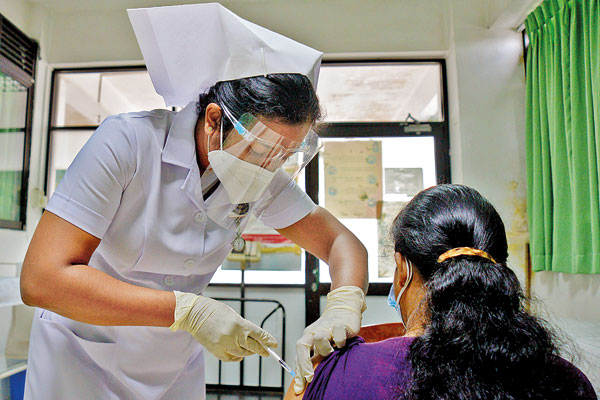News
Take the jabs to ward off death
“Get the jab, especially the booster and safeguard your lives. The vaccines save lives,” is the earnest plea of the Director-General (DG) of Health Services, Dr. Asela Gunawardena.

Vaccination rate on the rise: A scene at MOH office in Wellawatte on Saturday. Pic by Eshan Fernando
Very happy that the vaccination rate is picking up, he reiterates that side-effects (fever, pain at the injection site of the arm, body aches and pains, etc.) after vaccination are normal and mild. They “go away” in a couple of days. Therefore, the jabs are essential along with the other preventive measures (wearing face masks, hand hygiene, social distancing, avoiding crowds, avoiding enclosed spaces and unnecessary trips out of the home) to save lives and move forward in the new normal.
Dr. Gunawardena himself is an example of scrupulous maintenance of these measures, for throughout the Sunday Times interview on Wednesday (poya) afternoon, amidst the signing of piles of files, his office windows are open to let in the air and he remains masked all the time.
Heading the Health Services during unprecedented times (the last pandemic was before our times when the Spanish flu ravaged the world in 1918), he strongly urges people to continue to support the health authorities and take collective responsibility to ensure that “you are fully vaccinated if eligible; your near and dear ones are vaccinated; your neighbours are vaccinated; and your friends are vaccinated”.

Dr. Asela Gunawardena
“This is the way you can show them that you care and have their best interests at heart,” says the DG, urging young people to persuade their parents and grandparents to get vaccinated. For, the data are showing that there are nearly 45% among the elderly who are yet to get their booster.
The all-important topic of side-effects
The DG is succinct and clear – “The side-effects are very mild……99% get very mild side-effects. There may be a very few cases with slightly long-lasting discomfort but so far we (Sri Lanka) have not reported any severe cases with major adverse side-effects.”
The data are at his fingertips:
Sri Lanka has given almost 6 million booster doses
Nearly 31 million doses in total have been given in the primary vaccination schedule
“We have been monitoring the vaccination very carefully. Don’t be fearful – get the vaccine,” he adds.
The current death toll
Next Dr. Gunawardena looks at the death toll with regret – nearly 50% (half) of those who have died are not fully vaccinated and the majority are from the 60 and above age group with many comorbidities such as renal (kidney) disease, etc.
Giving an explanation as to what “unvaccinated” means, he says that they have not completed all three doses. They may have taken one or two doses, but it is not enough especially because in those 60 and above, immunity drops drastically. This is why the third dose or booster is vital.
“In a fit person, the immunity lasts about 6-8 months after primary vaccination (two doses). However, in the elderly, there are immunity issues, the immunity from the first two doses of the vaccine goes down in the 6th month. This is why we recommend that the booster should be given in 3 months,” he adds.
With regard to low vaccination numbers in the Kegalle district which saw him going there on February 4, the DG says that there had been a delay in entering the data due to trade union action. Now that the numbers are in, Kegalle has reached almost 50% of vaccination.
| Many places from which to get the jabThe Health Ministry including its ground-level staff along with the support of the security forces is on an all-out mission to ensure that no one falls through the cracks of the vaccination programme, assures Dr. Asela Gunawardena. Multi-pronged is the ministry’s approach: If someone is bedridden or unable to access a vaccination centre, arrangements have been made to send mobile units. The specifics are: The two National Hospitals (in Colombo and Kandy); the Teaching Hospitals; the Provincial General Hospitals; the District General Hospitals; and the Base Hospitals are open until 6 p.m. on weekdays to give the vaccine. While the Medical Officer of Health offices in each and every area are also administering the vaccine, they are also organizing vaccination clinics in villages. The tri-forces, meanwhile, are running vaccination centres in common places such as the Viharamaha Devi Park and Diyatha Uyana. They are also sending out mobile units.
| |
| Deaths & illness The data from the Epidemiology Unit show: February 11-18 – 8,506 new COVID-19 infections February 11-18 – 203 deaths The quarantine period for COVID-19 Dr. Gunawardena’s advice: If you are symptom-free for the last 48 hours of a seven-day period, then you can get out of isolation. If, however, symptoms persist over 6 days, then he/she has to stay another 48 hours after the required seven-day period, until absolutely symptom free for 48 hours before leaving quarantine, he added. Meanwhile, referring to concerns over a shortage of Rapid Antigen Test (RAT) kits, the DG added that India donated 100,000 RAT kits and is to send more, while the World Health Organization (WHO) is due to donate around one million kits in another two weeks.
|

The best way to say that you found the home of your dreams is by finding it on Hitad.lk. We have listings for apartments for sale or rent in Sri Lanka, no matter what locale you're looking for! Whether you live in Colombo, Galle, Kandy, Matara, Jaffna and more - we've got them all!

